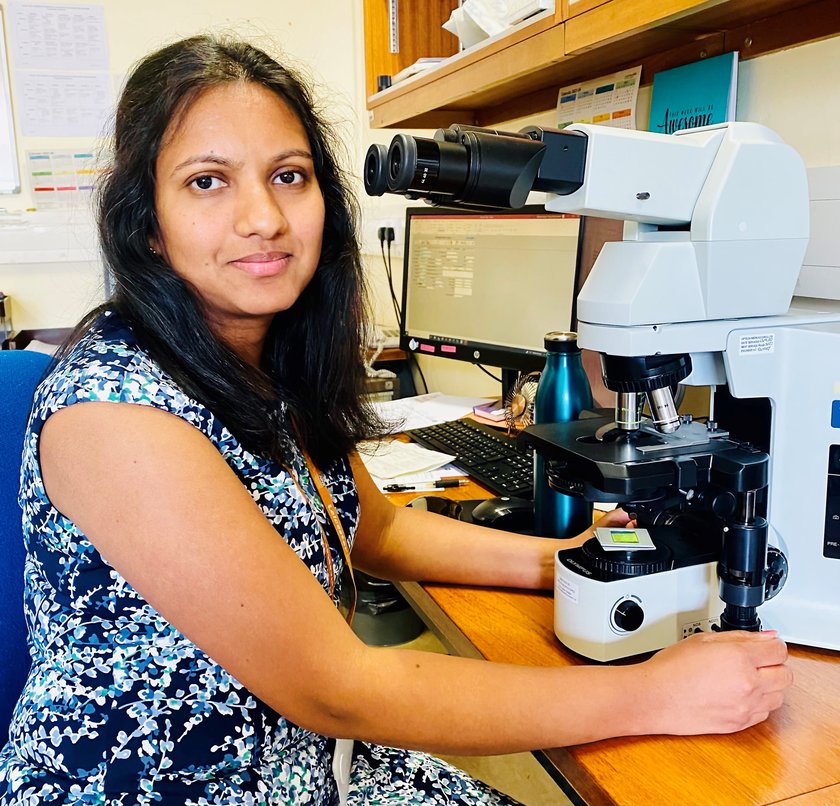Clinical scientists play a crucial role within the Genomic Medicine Service by providing the high-level knowledge and specialist expertise needed to run the service effectively. As well as checking referrals and assigning and activating tests, they analyse, interpret and report test results. They also act as a pivotal link between technical teams and clinicians treating patients.
For Saranja Rishikeson, the role of a clinical scientist bears resemblance to that of a detective. This profession revolves around unravelling medical mysteries specifically identifying genetic changes that contribute to rare conditions in patients. 'By pinpointing these genetic variations, we can offer timely and crucial information, potentially making a significant impact on their treatment outcomes.’
Currently working towards her clinical scientist registration, Saranja’s day-to-day duties may involve anything from running genomic tests on patient DNA samples to interpreting and reporting the results back to clinicians.
The battery of genomic tests range from microarray analysis – looking into how certain genes are being expressed – to karyotyping – structural changes within an individual’s chromosomes and Fluorescence in situ hybridization (FISH), a procedure that can visualise and locate the exact position of a specific DNA sequence on a chromosome.
So, what are the personal qualities needed to be a good clinical scientist? For Saranja, first and foremost, anyone wanting to be a clinical scientist should be passionate about genomics. Skills such as problem-solving, critical thinking, attention to detail, taking responsibility, and teamwork are also crucial. The healthcare landscape is constantly evolving, meaning that clinical scientists must adapt to new technologies, treatments, and methodologies.
Effective decision-making skills are crucial, particularly when confronted with unforeseen test results. For example, Saranja recently conducted analytical tests on a fetal DNA sample, revealing a variant on chromosome 16 that posed a significant risk of severe abnormality had the pregnancy proceeded to term.
The ability to work quickly under pressure is also key.

Sometimes we have to issue reports within 24 hours of receiving a sample, so we need to be able to work quickly and accurately in order to provide the best information to clinicians.
Saranja Rishikeson, pre-registration clinical scientist
Originally from Sri Lanka, Saranja graduated with a BSc in Genetics, Biochemistry and Biotechnology from the University of Bangalore. ‘This was where I gained my passion in genetics and genomics,’ she explains. She then worked as a medical laboratory technologist before moving to the UK.
Saranja’s first job within the NHS was as a Genetic Technologist at the Northwest Thames Laboratory. She then moved to Leicester: ‘We are a small lab of 20-25 people, the work is varied, and duties are rotated regularly. It’s nice mix of people and a great environment in which to work.’
After three years, she had the opportunity to start training as a Pre-registration clinical scientist and is currently completing her second year; this involves part-time study for a Master's degree in Genomic Medicine. The course covers 8 modules ranging from cancer pathology and rare disease to pharmacogenomics – the study of how an individual's genetic makeup can influence their response to medications, and personalised medicine plays a crucial role in providing targeted treatments.
It’s been very interesting. I particularly enjoy the pharmacogenomics module as this area is new to me. It’s fascinating to find out how our work enables clinicians to personalise medicine for patients.
Saranja Rishikeson, pre-registration clinical scientist
She is also undertaking a research project into next-generation genomic sequencing – to see whether it can speed up diagnosis and reduce the amount of breast cancer sample needed compared to existing genomic testing methods. "If all goes as planned, we could significantly influence patient treatment. We could provide clinicians with better information about cancer progression, helping them to select the best treatment option," she concludes.

